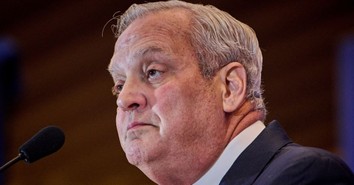The Five Core Values That Set a Faithful Church Apart

It’s an old phrase, but a telling one: Which hills are you prepared to die on? Meaning, which stands are you going to take no matter the cost? For what are you prepared to die? Your answer will determine your core values, and until they are established, your church does not have a defined DNA. And that means it will not be set apart.
If you were to compare the Christian churches in your city by doctrinal statement, there probably wouldn’t be much disparity. Most will not veer from the original Nicene Creed established by the early Church. If you were to compare them by purpose, again, you wouldn’t find many wavering from evangelism, ministry, discipleship, community and worship. We all get cute with nomenclature, but we don’t drift far from these five core purposes.
Even comparing your church to other churches in terms of mission won’t reveal much to the average observer. The Great Commission is pretty clear—the lesson of the sheep and the goats is apparent. In one form or another, we’re going to have a mission that embraces evangelism and discipleship along with social ministry.
So, what separates churches?
The hills they will die on.
Values.
Let me give you Mecklenburg Community Church’s (Meck’s) five core values, and perhaps you’ll see what I mean.
1. The Bible is true, and its teaching is the catalyst for life change in individuals’ lives and in the church.
From day one, whenever it comes to what to believe, how to think, how to live our lives, and where we should land on a particular position or issue, first we go to the Bible and then we go with the Bible. We believe the Bible is the inspired Word of God and that it is without error. And when it comes to what we understand to be the essential beliefs of the Christian faith, we must have absolute unity (see Ephesians 4:4-6, NIV).
There are certain elements to being a Christian church—certain beliefs, convictions and doctrines. If you cease to hold to those beliefs, you cease to be Christian. So, on the essential doctrines of the Christian faith, we must have unity. On the non-essential beliefs, we want there to be liberty or freedom. And finally, in all things we want to have an attitude of charity, which is simply another word for love. As a church, we have made the decision to agree to disagree agreeably.
2. Lost people matter to God; therefore, they ought to matter to us.
This value puts us on a mission. It tells us we have a clear cause: we are to be turned outward, not inward. For Meck as a church, growth is not an option but rather an absolute imperative. As long as there is one lost person left in our community, we are going to try to grow. We never view people outside of the church as the enemy—with an us-vs.-them mentality. Instead, we continually strive to reach out to people who don’t know Jesus, who aren’t in a relationship with Him, and who aren’t already connected with a church. They matter to us. And from day one, Meck’s primary strategy for outreach is to work through relationships—simply inviting people to come and see, come and explore, come and experience.
3. The church should be culturally relevant while remaining doctrinally pure.
We are trying to bring the message of Jesus to our world—and not just to our world, but also to our nation, to our city, to our time. So what we say and do must make sense to the person experiencing it. The apostle Paul had a deep commitment to this, once writing that he became “all things to all people so that by all possible means [he] might save some” (I Corinthians 9:22, NIV).
The message of the gospel is unchanging; the method of communicating that gospel must change according to the language, culture and background of the audience. We never want to abuse this or cross a line. The goal is to be in the world, not of it. But we are to be out there on the front lines, communicating the gospel in the most compelling, culturally relevant and understandable way possible. We really do believe the church is the hope of the world. And there’s nothing more worthy of committing your one and only life to.
4. The church should operate as a unified community of servants stewarding their spiritual gifts.
The Bible teaches that every member of the church is a minister based on how God has gifted them—not just the ordained clergy or paid staff of the church. We want people to discover their spiritual gifts, to develop them, and to be freed up to use them in whatever capacity God intends so they can make a difference in the world.
We should have administrators administrating, teachers teaching, singers singing, counselors counseling and leaders leading. And we want people to do this with a servant’s heart, a servant’s mind and a servant’s attitude. To be an authentic follower of Jesus means to be a person who has had the deepest needs of their life intersected by Jesus. That means we must continually grow in our faith and our relationship with Him.
5. Loving relationships should permeate every aspect of church life.
This value should drive us to be zealous defenders of the community of this church. We do everything in our power to relate to one another lovingly, truthfully, compassionately and graciously.
When there is conflict or tension, stress or misunderstanding, we tackle it head-on within the context of love. We’re not going to let it go underground, much less let it become cancerous so that it infects the body of Christ. As Jesus said in Matthew’s biography of His life: “If your brother or sister sins [against you], go and point out their fault, just between the two of you. If they listen to you, you have won them over” (18:15, NIV).
I know we won’t all be equally close to one another; this isn’t about every single person being your best friend. But we can be loving in our spirits, gracious in our hearts, and fiercely loyal to each other.
Now, stating core values is meaningless. Living them, upholding them, modeling them, rewarding them, protecting them—that’s what matters.
And when that’s done, your values become your DNA.
So what are your values?
James Emery White
Editor’s Note
This blog was originally published in 2017 but has been updated by the Church & Culture Team. We thought that you would enjoy reading it again.
Sources
Adapted from James Emery White, What They Didn’t Teach You in Seminary (Baker), order from Amazon.
Photo Courtesy: ©Getty Images/Ehrlif
Published Date: July 7, 2025
James Emery White is the founding and senior pastor of Mecklenburg Community Church in Charlotte, NC, and a former professor of theology and culture at Gordon-Conwell Theological Seminary, where he also served as their fourth president. His latest book, Hybrid Church: Rethinking the Church for a Post-Christian Digital Age, is now available on Amazon or from your favorite bookseller. To enjoy a free subscription to the Church & Culture blog, visit churchandculture.org where you can view past blogs in our archive, read the latest church and culture news from around the world, and listen to the Church & Culture Podcast. Follow Dr. White on X, Facebook, and Instagram at @JamesEmeryWhite.
Originally published July 07, 2025.







